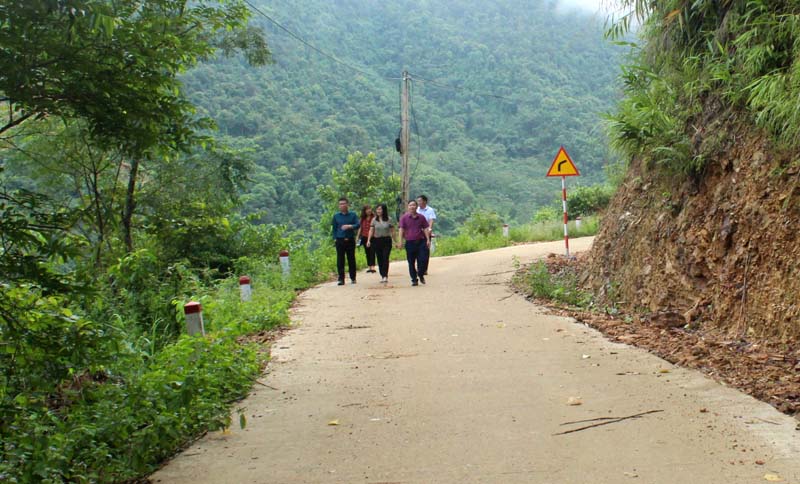
(HBO) – Da Bac district, spanning 77,976 hectares of land, has 20 communes and town covered by Programme 135 – programme for socio-economic development in specially-disadvantaged communes in ethnic minority and mountainous areas.
 Thanks to investment from Programme 135, roads in Sung
hamlet (Cao Son commune) were concretised, helping the hamlet develop
community-based tourism.
Thanks to investment from Programme 135, roads in Sung
hamlet (Cao Son commune) were concretised, helping the hamlet develop
community-based tourism.
Vice Chairwoman of the district People’s Committee Bui Thi Hieu said the
district has made poverty alleviation a key mission, which is inseparable from
the local socio-economic development strategy.
The spirit of self-reliance should be promoted among impoverished households so
as to realise the sustainable poverty reduction target, she added.
In the past time, the national target programme on sustainable poverty
reduction has served as a lever for the district’s socio-economic development.
Programme 30A, which is designed to support 64 poorest district across the
country to rapidly reduce poverty through investment in essential
infrastructure system, has given a facelift to Da Bac district. New infrastructure
facilities have been built and existing ones repaired and upgraded; poverty
alleviation models have been set up to improve and diversify local livelihoods.
Under the programme, many labourers from poor, near poor and ethnic families
have chances to work abroad.
Particularly, Programme 135 helped the district build 33 public works, maintain
52 others, support 28 production models, and open training class to transfer
science and technology in 2018.
This year, Da Bac district received 20.48 billion VND from the programme to
upgrade and build local infrastructure.
Along with the programmes, the district People’s Committee has pushed forward
with the preferential credit policy for households living under and just above
the poverty line, and those who have just escaped poverty.
The sustainable poverty reduction programmes have promoted socio-economy in Da
Bac district, resulting in the fall in the poverty and unemployment rates.
Last year, poor households accounted for 37.04 percent of the district’s total
families. The rate is projected to drop to 32 percent in 2019./.
The Standing Board of the Hoa Binh provincial Party Committee has agreed in principle on a proposal by the Standing Board of the Party Committee of Hoa Binh city to gather feedback on the city’s 1:2000 zoning plan, which forms part of its broader urban development strategy.
Hoa Binh province has made notable progress in public administration reform and digital government development, with the satisfaction index among citizens and businesses reaching over 84%, according to recent government evaluations.
Thanks to great efforts by local authorities in recent times, the governance and public administration performance of Mai Chau district has been significantly improved.
In the afternoon of June 6, the Party Committee, the People's Council, the People's Committee and the Fatherland Front of Lac Son district solemnly held a meeting to celebrate the 139th anniversary of the district's founding (1886–2025) and the 79th anniversary of the establishment of the district's Party Committee (1946–2025). There was the attendance of Mr. Bui Van Thang, the Vice Chairman of the Provincial People's Council; Mr. Quach Tat Liem, the Vice Chairman of the Provincial People's Committee; Ms. Dang Bich Ngoc, the Deputy Head of the National Assembly Delegation of the province; as well as the former leaders of the province and district through various periods, who are the natives of the district.
Implementing the Politburo’s Resolution No. 57-NQ/TW on breakthroughs in science – technology, innovation, and digital transformation is a golden opportunity for the northern mountainous province of Hoa Binh to renew growth model, improve competitive edge and shorten digital gap.
Resolution 57-NQ/TW, issued by the Politburo on December 22, 2024, identifies sci-tech, innovation, and digital transformation as strategic breakthroughs to build a developed and prosperous nation. In Hoa Binh province, this spirit is not just a slogan, it’s being put into action through concrete initiatives that form a "new development triangle”: digital citizenship, digital economy, and digital administration.



 Thanks to investment from Programme 135, roads in Sung
hamlet (Cao Son commune) were concretised, helping the hamlet develop
community-based tourism.
Thanks to investment from Programme 135, roads in Sung
hamlet (Cao Son commune) were concretised, helping the hamlet develop
community-based tourism.